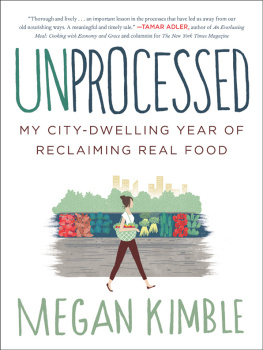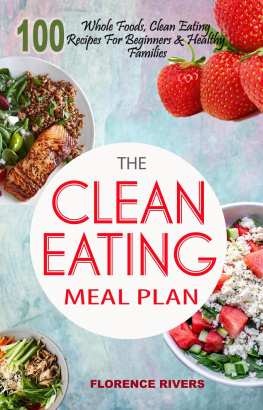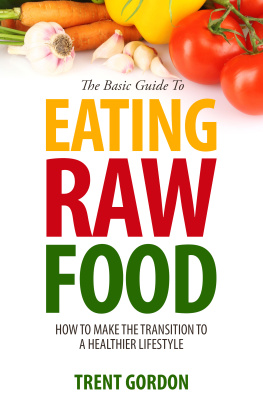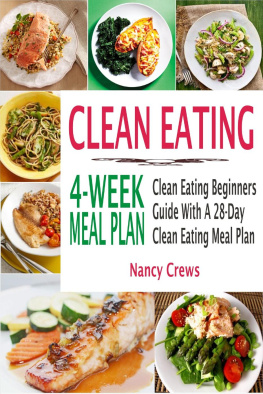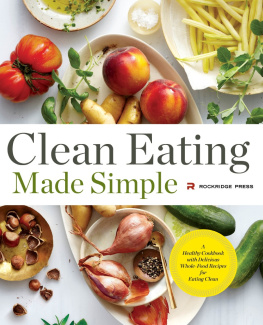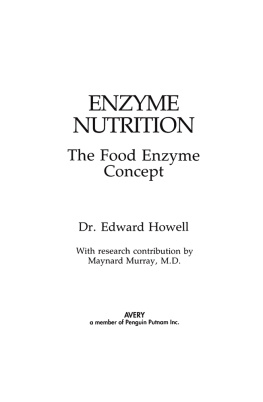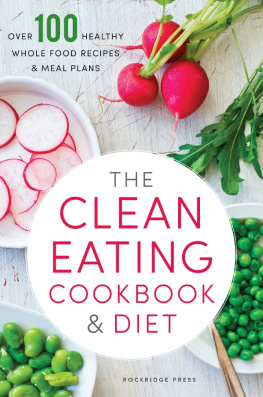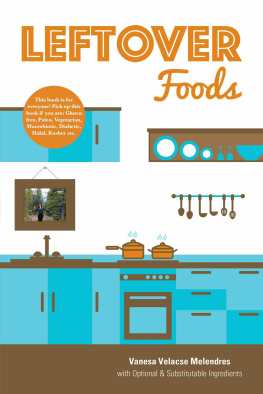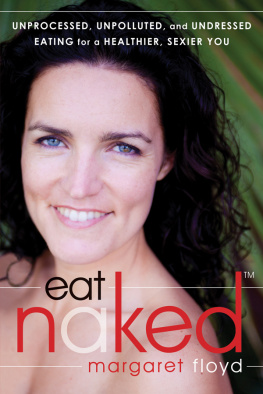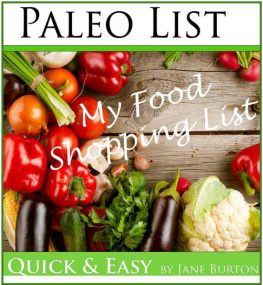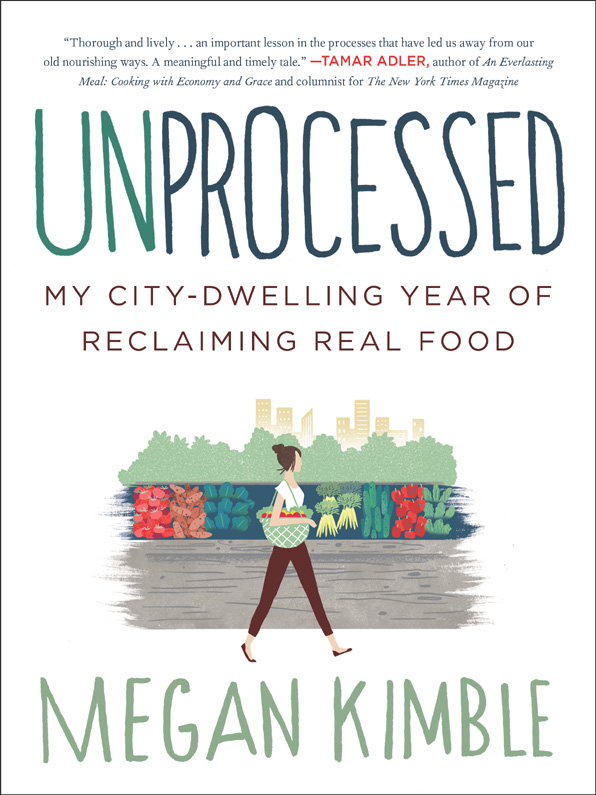CONTENTS
Guide
For my parents, Midge and Jeff Kimble.
Because of Katie, my best friend and faithful editor.
Wait, Tyler says. Isnt peanut butter processed?
The peanut butter jar is in my left hand, spoon in my right; a banana, unpeeled, waits on the counter. I stick the spoon back in the jar and turn to face Tyler, my sisters husband, sitting at the kitchen table of my parents house outside Los Angeles.
No, I say. Its just ground-up peanuts.
Isnt that a kind of processing?
Well, yes. I mean, all foods are processed, at least to some degree.
So then whats the difference between ground-up peanuts and, say, partially hydrogenated peanut oil?
I sigh. I thought my sister had already explained the logic of my upcoming year to her husband, but evidently Tyler is feeling contrary this January morning so soon after the holidays. Its pestering like this that makes him feel more like a brother than a sisters husband, but I am nervous on the cusp of a year unprocessed and I dont want to argue semantics. There are degrees of processing, I say, placing the peanut butter jar back on the counter. Im trying to find the line where a food becomes too processed. With the exception of, say, a raw, foraged mushroomrisky businessall food has undergone some processing before landing on our plates. By way of harvest or heat, all food is processed, and often it is the better for it.
But increasingly, it is not. Today, the word processed refers to adulterated foodsfoods that have been shifted and shaped into packages that are not better, not for us or for the earth. All foods are processed, but if we understand the difference between an apple and a bag of Chex Mixand we doand if the space between the two matters for the health of our bodies and the environmentand it doesthen the question of what makes a food too processed also matters.
Id decided to see if I could go a year without eating a processed food. Or rather, a food I deemed too processed. When I first hatched the project, around the time that Tyler was bugging me in my parents kitchen, I thought that I should figure out precisely what made a food processed and then begin. But as it turned out, it would take me a year to figure out where to draw the line, to understand where our food system succeeds and fails in processing food from land. That figuring out is what youre holding in your hands.
I HEARD MICHAEL POLLAN INTERVIEWED on NPRs Wait Wait... Dont Tell Me several years ago. The host of the show, Peter Sagal, introduced him as the most well-known authority on food and food economics working today, a description that is as true now as it was then. The two chitchatted for a bit and then Sagal asked Pollan, So, if you ever want to eat a cheeseburger, do you have to go hide somewhere?
Pollan laughed. Shortly after I got to Berkeley, he said, I was in Berkeley Bowl... a local supermarket, which has wonderful fresh produce, grass-fed beef. What was Michael Pollan buying at the Berkeley Bowl? Fruity Pebbleshis son Isaacs Saturday-morning treat. So I was reaching for a box of Fruity Pebbles, he said, and somebody tapped on my shoulder. And it was this tall, bearded graduate student and he said [whispering], Im watching Michael Pollan shop for groceries.
When you are ten years old, even if Michael Pollan is your father, Fruity Pebbles are fun to eat on Saturday mornings. When you are twenty-six, even if you know better, shrink-wrapped chocolate chip cookies are fun to eat on Saturday nights. With food, its not just easy to look the other way, to ignore the ingredient labelit is, in fact, delicious to do so. On a Saturday morning, Michael Pollan is a father whod rather relax than explain to a ten-year-old why the corn syrup in his processed cereal is causing his pancreas to overproduce insulin.
Although it is impossible to speak of food without discussing the dysfunction in how we now grow, prepare, and eat it, this is not a book focused on whats gone wrong. Michael Pollan, for one, has already led the charge of uncracking the truth of a food system gone astray. Since Pollan wrote The Omnivores Dilemma and Gary Paul Nabhan wrote Coming Home to Eatthe epicenter of his 220-mile local food experiment was just south of Tucson, where I live and where my year unprocessed unfoldedand Barbara Kingsolver left Tucson to write Animal Vegetable Miracle, consumer consciousness has swelled. Awareness has shifted. Local, organic, sustainablethese are all words now in the public vernacular. But in early 2012, when I stopped eating processed food, farmers markets accounted for only 1 percent of total food sales; organic foods represented only 2 percent of total grocery sales. If we knew what had gone wrong, why werent we doing anything about it?
This is where I begin. Youve likely heard the chargeVote with Your Forkbut I wanted to test how feasible that advice really is. Today, many of us are stuck between knowing what we should do and feeling like we dont have enough time or money to do it. Eating unprocessed was my attempt to find another way in, unburdened by should do, focused instead on can do.
Change is hard. Small choices gain inertia and turn into habits, and we are all busy, broke, and stuck in our whirlwind cities. But if Suze Orman writes money books enlightening the Young, Fabulous & Broke about their financial futures, then this, I hope, is some small manifesto for the busy, urban, and broke about their edible futures.
IN THE SPRING OF MY SENIOR YEAR in college at the University of Denver, I saw Al Gore give the famous PowerPoint presentation that inspired the documentary An Inconvenient Truth. I had seen the film the previous Christmas with my sister and mom; those two hours sitting in a dark theater horrified us. The world was beautiful, it was whole, and we were breaking it apart. And then the credits rolled. The theater lights lifted and we walked, knob-kneed, out of the theater. Our fear dissipated into dinner plans.
The evening I went to see Al Gore in the flesh, I was on the precipice of all those decisions that come with college graduation. Riding the light rail downtown, I read a few pages in Ernesto Guevaras Guerrilla Warfare. I was taking a senior seminar about Che, and although I wasnt into the icons militarism and ego, I was enthralled by his boldness, how hed stuck his thumb into the spinning status quo and changed how one small part of the world worked. I was enthralled, but in my life, being this boldChe boldfelt incompatible with an infrastructure already in place, one that included careerbuilder.com and an apartment lease. As commencement approached, we graduates were told again and again: Be bold. But I didnt really know how. I wondered: Does boldness exist only in military fatigues? Could it also wear a sundress and flip-flops?
Al Gore was, as I expected him to be, amiable and twangy. But unlike the movie experience, I was actively in my mind and body as I listened, fidgety and lacking the distance offered by film. The lights in the convention center never dimmed and so they didnt rise. I carried my terror with me all the way home. It was all happening now, chemicals in the air, a sweating world, it was nownownow9 P.M. on a Tuesday. I called my dad, a quantum physics professor, arbitrator of big decisions.
Right, he said. Its scary stuff.
But what do we do? I asked. What do I do? I should change my major from English to astrophysics or environmental science, I could just stay in college for another year. I would learn the tools needed to fix this problem. Global warming was

